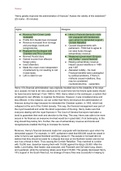History
“Henry greatly improved the administration of finances” Assess the validity of this statement?
(25 marks - 45 minutes)
Agree Disagree
● Revenue from Crown Lands ● Henry’s financial demands made
increased. him unpopular with landowners
● Profits from feudal dues increased upon whom he demanded support -
● Revenue increased from tonnage Cornish Rebellion
and poundage, bonds and ● Caused disagreements with
recognizances parliament - 1504 had to agree to
● Replaced the Exchequer with not raise funds through
Chamber and Privy Chamber extraordinary revenue.
● Revived Feudal dues ● Weakened government (Empson
● Gained income from effective and Dudley - council learned)
foreign policy ● Raising extraordinary revenue
● Used attainders. helped caused rebellions in 1489
● Made the crown more independent and 1497
of parliament by not needing to call ● Alienated nobility - his main
it raise taxes. Financial benefits were outweighed
● Left no debt for son by political problems, if Henry’s
methods caused rebellions, they
may be considered
counterproductive. supporters.
Henry VII’s financial administration was originally troubled due to the instability of his reign
as a usurper, he had to be very cautious as he could have lost his throne quite easily should
he have become bankrupt. From 1485 to 1493, Henry relied on the exchequer, a system that
employed its own officials, to organise his finances. However, it was considered slow and
less efficient. In this instance, we can confer that Henry did improve the administration of
finances during his reign because he reinstated the Chamber system, in 1493, which had
collapsed at the end of the Yorkist dynasty. This way, the financial management was part of
the royal household and under the direct supervision of the king. Henry made sure that
everyone dealing with the royal finances in The Court of General Surveyors had taken a
bond to guarantee their work and devotion to the king. This way, Henry was able to be more
secure in his finances as everyone involved would be in great debt, if not bankruptcy, to the
king should they betray him. Further, this use of extraordinary revenue and bonds and
recognizances enabled the King to increase his income.
Moreover, Henry’s financial demands made him unpopular with landowners upon whom he
demanded support. For example, in 1497, parliament voted that £60,000 would be raised in
order to fund a war against Scotland and King James IV. The people in Cornwall did not
believe that they should be taxed for a dispute that was on the Northern border and did not
see it as a threat to them. Thus causing the Cornish Rebellion. They marched to London
with 15,000 men, desertion leaving them with 10,000 against the King’s 25,000. After the
battle, Lord Audley, their leader, was executed, and Flanmark and Gof were hung, drawn,
and quartered, while the remaining rebels were fined £15,000. This greatly decreased Henry
VII’s support in the South West but, his strategy of heavy fines was successful in helping to





